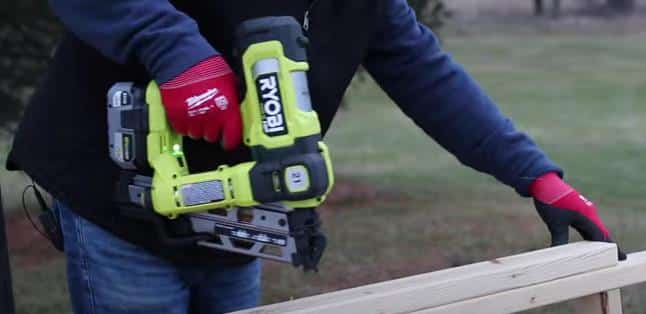Framing nails are highly required for any construction project that involves framing, sheathing, or other similar tasks. These nails are made to be used with nail guns. They usually come in various sizes and styles to fit different materials and job needs.
If you’re new to working with framing nails, you might wonder, “are framing nails interchangeable.” Framing nails are interchangeable. But framing nails are not always interchangeable, as different types of framing nails are designed for specific applications.
The size, length, and diameter of framing nails can vary, and some nails are designed to work better with specific types of wood or construction materials.
You can use either a 16d or 20d nail for framing. However, 16d nails are better for softwoods, while 20d nails are better for hardwoods.
In this blog post, I’ll discuss this question and show you how to choose the right framing nail for your project.
What Are Framing Nails?

Before we dive into the question of “what are framing nails.” let’s take a moment to define what framing nails are.
Framing nails are usually longer and thicker than other nails. They can be 1 1/2 inches to 3 1/2 inches or longer. They often combine large pieces of wood, like building walls or roofs.
Framing nails usually come in sizes like 8d (2 12 inches), 10d (3 inches), and 16d (3 12 inches), but they may also come in other sizes. They can be made from different materials, like steel or stainless steel, and coated with galvanized zinc to keep them from rusting or corroding.
Are Framing Nails Interchangeable?

Now, let’s address the question of interchangeability. Are framing nails interchangeable, or do you need to choose a specific type of nail for each job?
The answer to this question is: “It depends.” There are many different kinds of framing nails, but not all can be used with each other. In general, choose a framing nail with the correct length, the right kind of shank, and the right kind of head for your project.
Length: The length of your framing nail depends on the thickness of the material you’re nailing through and the thickness of any other layers you may be nailing through. If you use a nail that is too short, it won’t go far enough into the wood. If you use a nail that is too long, the wood will split.
Type of Shank: The part of a framing nail with ridges or threads is called the shank. Different shanks exist, such as smooth, ring, and screw. The type of shank you choose will depend on what you’re nailing together and how strong you need the hold to be.
Head Type: Finally, the head of a framing nail can be round, clipped, or offset, among other shapes. The type of head you choose will depend on what your project needs.
Are Framing Nails Interchangeable With Other Types Of Nails?
No, framing nails are not interchangeable with other types of nails.
Knowing which nails to use for each task is important if you’re working on a construction project. For example, you wouldn’t use the same nails to hang a picture frame or build a wooden fence.
Now, I’ll explain the different types of nails and when to use them.
The most common type of nail is the common nail. These are the nails you’ll find in a hardware store and are used for general-purpose applications. Common nails are available in different lengths and diameters so that you can choose the right size for your project.
Another type of nail is the finishing nail. These nails have a small diameter and are used for tasks that require a smaller nail, such as attaching trim or molding. Finishing nails are also available in different lengths so that you can choose the right size for your project.
If you’re working on a project that requires a strong nail, such as building a deck, you’ll need to use a framing nail. Framing nails are much stronger than common nails and are available in different lengths.
So, are framing nails interchangeable with other types of nails?
No, framing nails are not interchangeable with other types of nails. Each type of nail is designed for a specific purpose, and you should use the right type of nail for your project.
The Benefits Of Using Framing Nails
Framing nails are designed to provide a secure hold in wood framing applications.

If you’ve ever used a hammer to drive a nail into a piece of wood, you know it can be difficult. The head of the nail can slip off the wood, or the nail can bend. Either way, it can be frustrating.
There is a solution, however. It’s called a framing nail.
A framing nail is a type of nail that is used for framing. It is thicker and longer than a regular nail and has a different head. The head of a framing nail is wider and flatter, which makes it easier to grip.
There are several benefits to using framing nails.
- They are less likely to slip or bend. This means you can hammer them in with less effort, and they will stay in place better.
- The wider head of the nail provides more holding power. This is especially important when you are working with heavier pieces of wood.
- The nail’s longer length means you can use them for various applications. You can use them to attach sheathing to framing or trim to a wall.
If you are making any home improvement that involves hammering nails into wood, you should consider using framing nails. They will make your job easier and provide a better result.
Disadvantages To Using Framing Nails
The main disadvantage of framing nails is that they are not as strong as other types of nails, making them more likely to come loose over time.
You’ve probably used your share of framing nails if you’re a professional contractor. But are there any disadvantages to using them? Let’s take a look.
- The first thing to consider is the cost. Framing nails are generally more expensive than others, so they may not be the best option if you’re on a tight budget.
- Another thing to remember is that framing nails are much thicker than others, so they can be a bit more difficult to drive into some materials. This is especially true if you’re working with thinner lumber.
- Finally, framing nails are more likely to split the lumber you’re nailing into because of their size and thickness. So, if you’re working with particularly fragile lumber, you may want to use a different type of nail.
Overall, there are some disadvantages to using framing nails. However, they’re still popular for many contractors because they’re very strong and durable. They may be the best option for you if you’re planning a big project.
How Do I Know If A Particular Nail Is A Framing Nail?
To determine if a nail is a framing nail, look for the words “framing nail” or “coil nail” on the label.
When you’re at the hardware store looking at nails, figuring out which kind you need for your project can be difficult.
Here’s a quick guide to help you choose the right framing nails.
If you’re working on a project that involves any wood frame, you’ll need to use framing nails. These are larger and thicker than other nails, specifically designed to hold together wooden framing.
If you’re unsure which size nail you need, ask a store employee for help. They should be able to point you in the right direction.
Once you’ve got your framing nails, it’s time to work. Remember to use a heavy hammer to drive the nails into the wood.
What Is The Difference Between Framing Nails And Other Types Of Nails?
Framing nails are made to hold pieces of wood together, like when building a house. They are thicker and have a larger head than other types of nails.
When it comes to nails, there are many different types and purposes. So, what is the difference between framing nails and other types of nails?
Framing nails, also known as common nails, are the most popular type of nail used in construction. They are available in many sizes, but the most common size is 3-1/2 inches.
Framing nails are made of steel and have a smooth, slightly rounded head. The nail’s shank is tapered, making it easy to drive into lumber.
Other types of nails include finishing nails, roofing nails, and flooring nails. Finishing nails are smaller than framing nails and have a smaller head. They are used for trim work and other delicate applications.
Roofing nails have a large, flat head and are used to secure roofing materials. Flooring nails have a large, flat head and a long shank. They are used to install hardwood floors.
You can find it at your local hardware store no matter what type of nail you need.
FAQ
What Are Some Tips For Using Framing Nails?
There are a few things to keep in mind when using framing nails:
-Choose the right size nail for the job. Framing nails come in different sizes, so select the appropriate size for the project you are working on.
-Use a nail gun that is designed for framing nails. Not all nail guns are created equal, so using a gun that is specifically designed for framing nails will make the job much easier.
-Be careful not to overdrive the nails. This can damage the wood and make it more difficult to remove the nails later on.
-Use a nail set to countersink the nails if necessary. This will ensure that the nails are flush with the surface of the wood.
How Can I Tell If A Framing Nail Has Been Properly Installed?
If the framing nail has been properly installed, the head of the nail will be flush with the wood surface.
What Are Some Common Problems Associated With Framing Nails?
Some common problems associated with framing nails are that they can bend easily, and the heads can pop off. Also, if the nails are not driven in all the way, they can come loose and fall out.
Final Words
Are Framing nails interchangeable? While many types of framing nails are available, not all are interchangeable. Length, shank, and head types are important when choosing a framing nail. Using the improper nail might cause wood to crack or nails to back out, compromising your project’s safety and stability.
Selecting the correct framing nail for your project ensures safe, robust, and reliable construction. And using any framing nails you have on hand may be tempting, but choosing the appropriate nail can save you time and money.
I hope this blog post has helped you understand framing nails, their purposes, and how to choose the proper nail for your next building job. Contact your local hardware shop or contractor if you have any questions.

